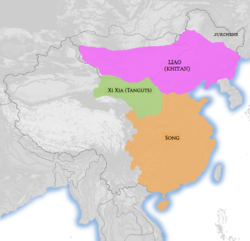Every culture has its historical moments that matter a great deal to its members. The moments can be mythological: in the English-speaking world, millions care about the legend of Robin Hood and whether it reflects a historical reality. It is hard to go broke making a movie about Robin Hood.
If the fall of the Tangut kingdom is your emotionally resonant moment in history, this is the movie for you. A combination of Russians, Mongolians, Kazhaks, and Germans have invested a lot of money and talent on the intuition that there are millions of moviegoers just like you.
Just in case you have never heard of the Tangut kingdom, this destruction, if you believe the movie, was the turning point in the early life of Genghis Khan. Its destruction begins and ends the movie; in between there is a rather curious account of the early years of the great conqueror, when he is repeatedly betrayed, defeated, robbed of all his meager wealth, and enslaved. The only positive elements in the story are his relationship with his wife, and his relationship with a blood brother who is not always on his side. Oh, he is also faithful to the Mongol code, which other people give lip service to but ditch whenever it is convenient. Thus Temugin's (Genghis' ) rough early years. He plays by the rules, everybody else cheats. But don't worry, he will undoubtedly return in a later movie (if financing is available) to teach the Mongols law. In the meantime, he looks soulful, and does not send away his wife, whom he chose when he was nine, even though there is a reasonable doubt about the paternity of her son. (She was kidnapped by his enemies and who knows what happened then.)
A whole bunch of cultural buttons are being pushed here, but if you're not a Central Asian it's not exactly clear what they are.
This may come across as a negative review, but actually it is a well made movie. It's just not Robin Hood. For the non-Central Asians among us, the most remarkable feature of the film may be the vast landscapes which fill the screen for the entire two hours.
Images: top, Temugin, played by the big Japanese star Tadanobu Asano; bottom, the Tangut kingdom (Western Xia), shown in green.


For my part, I will just say that I found this movie to be great! I was apprehensive at first about the subtitles, but it is so visually stunning and well made that after a few minutes I completely forgot the subtitles and was absorbed in the movie. If you are interested in the the horse culture of the time and area, while I can't say for sure, it seem to be pretty well represented, based on my limited knowledge.
ReplyDelete